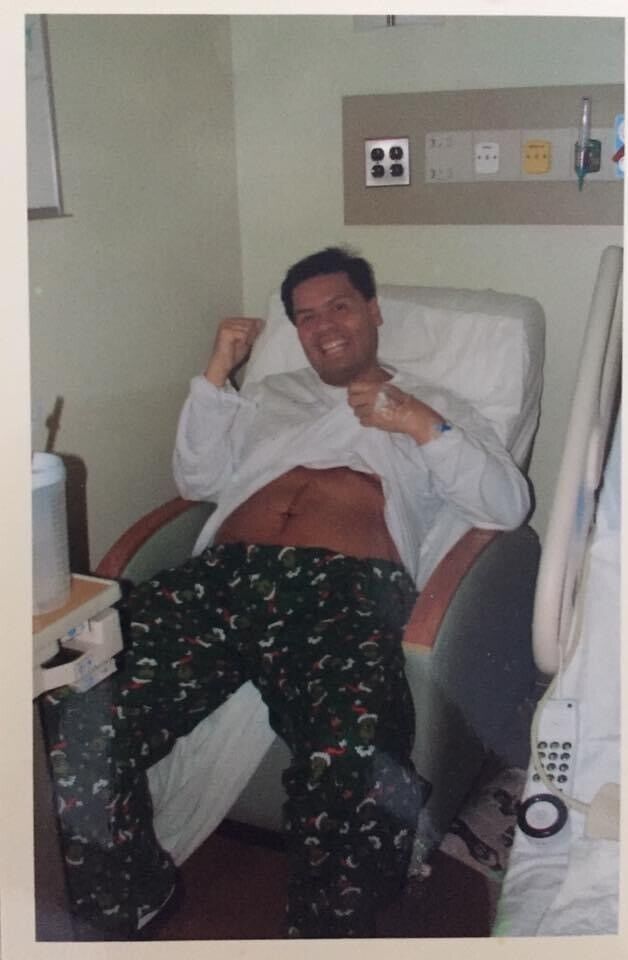March is Colon Cancer Awareness Month, and a new study shows that people being diagnosed with the disease are getting younger and younger.
According to the American Cancer Society, 1 in 5 people who get colon cancer are under the age of 55 years old.
In 2006, WTOP producer Mike Jakaitis was 36 when he found that he had colon cancer.

Jakaitis said he was fatigued and had some blood in his stool. He was also unable to give blood that summer because his white blood cells were “out of whack.” Jakaitis said he just thought it was something that would pass, but his wife Kellie gave him the nudge he needed to see the doctor.
“I saw my doctor, and I told her I had bleeding when I went to the bathroom, so you know, hearing that, and then seeing the results, recommended colonoscopy,” Jakaitis said.
That would lead to a diagnosis.
Colon cancer can be treated if detected early in many people but deadly if found too late. In Jakaitis’ case, he had a third of his colon removed. Since then, he has been cancer-free. That’s almost 17 years.
Jakaitis is among those helping to spread awareness about colon cancer with the goal of saving lives. Colon Cancer Awareness Month kicks off with “Dress in Blue Friday” on March 3. People are encouraged to dress in blue to spread awareness and honor those affected by the disease.
“Time is our biggest risk factor,” said Dr. Joesph Jennings, a gastroenterologist with MedStar Health.
The study also noted a 1% increase in deaths for those diagnosed under the age of 50 since 2004.
Jennings said early detection is key, but in the early stages of the disease, a person might not have symptoms. Because of that, everyone 45 years or older should begin routine screening for cancer, no matter their race or ethnicity.
“The more aware of what we are and the more proactive we are, we’re actually much more likely to get really good positive outcomes,” Jennings said.

Jennings did say the 45 and up screening is for people at average risk of developing colon cancer, but if a person has a family history of the illness or if they are adopted and do not know their family history, doctors may recommend earlier screening. Also, other factors, including genetic conditions, may prompt earlier screening.
For Jakaitis, there could have been a family history of the illness that he didn’t know about until after his diagnosis. Jakaitis said his mother’s uncle died in the Philippines of a stomach illness many years ago; he said the family suspects now that may have been colon cancer.
In Jakaitis’ case, he had several symptoms pointing to colon cancer. Dr. Jennings said blood in a person’s stool is a telltale sign, so are changes in the shape and size of a person’s stool that does not fluctuate with what you eat. Bloating, abdominal pain and unexplained weight loss are also symptoms.
“If you see those, and they’re not getting better, definitely talk to someone about it, so we can get you checked out,” Jennings said.
While Jennings recommends starting a conversation about any of these symptoms with your primary care doctor, with the more severe symptoms, a person would be referred to a gastroenterologist.
Jennings said whether cancerous polyps are found during a routine colonoscopy or during an investigation into symptoms, the cancer can sometimes be removed in its entirety during the same procedure.
“So, in that scenario, that person got diagnosed, treated and cured of their colon cancer all in one setting, which is a unique positive of colonoscopy as the tool for colon cancer screening,” Jennings said.
Jennings said depending on where the cancer is, there may be further surgery and treatment, including chemotherapy.
Jakaitis encourages everyone to get regular colonoscopies and not to ignore symptoms.
“If you have any kind of warning sign, I tell people, you know, get yourself checked out,” Jakaitis said.
Jakaitis said he feels as if he’s been given a second chance, and he counts his blessings every day. Also, he owes his life to his wife, Kellie, he said.
“If I didn’t listen to my wife, we’re not having this conversation now,” Jakaitis said.
On Friday, Jakaitis plans to wear blue to work at WTOP and encourages others to do the same.
“I’m a big Eagles fan, but if you’re a Cowboys fan and you want to wear blue, it’s the only day I endorse it,” Jakaitis said with a laugh.
The Colorectal Cancer Alliance offers a free online quiz that can help a person determine their risk.








